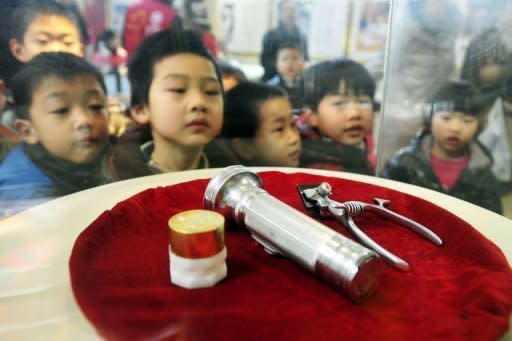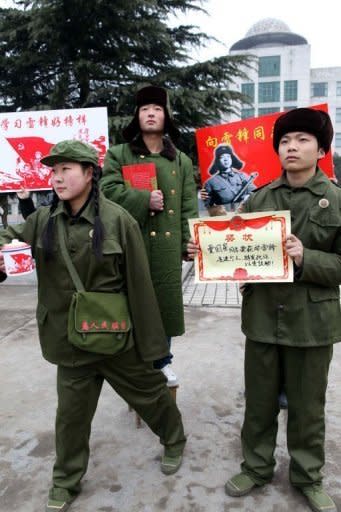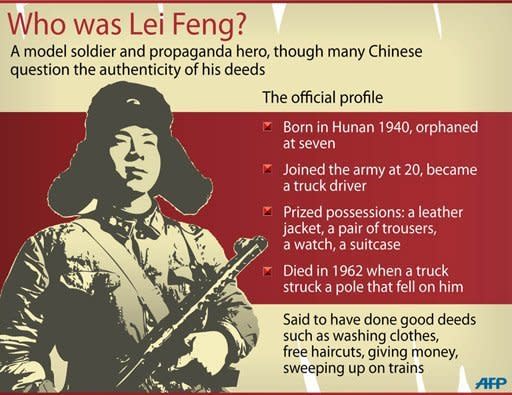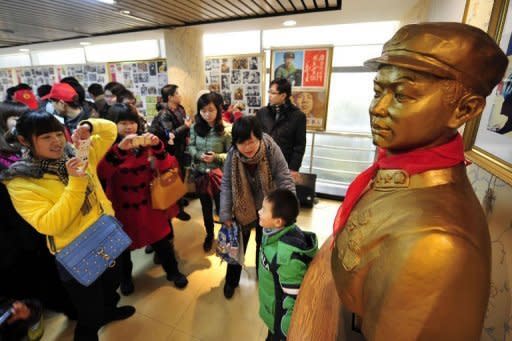Chinese propaganda hero struggles in Internet age
A Chinese government publicity campaign to promote selflessness using the model of soldier Lei Feng, who died 50 years ago, is encountering resistance from an increasingly media-savvy population. Ever since China's supreme leader Mao Zedong recognised Lei Feng for his humble heroism, said to include washing his comrades' uniforms and giving his pay to the needy, authorities have encouraged citizens to do good every March. To mark five decades since his death, authorities have launched a huge public campaign through the official media, which have been awash with invocations for Chinese citizens to follow his example. But with the rise of the Internet -- China now has the world's largest online population with more than half a billion users -- the soldier has come under attack as people question his good deeds and relevance for modern times. Critics say the government's way of delivering the message is heavy-handed, and that the lessons Lei Feng has to offer have little to do with modern China and its increasingly wealthy people. "If you are living in this day and age, becoming a billionaire is a must. Worshipping a pure individual really is not a must," posted one blogger on Chinese web giant Sina's popular weibo, or microblog. The campaign has been given added urgency by the nationwide soul-searching provoked by an incident in October when at least 18 people passed by a child who had been run down in the street as she lay fatally injured. In an editorial, the official China Daily newspaper said the death of the two-year-old girl, Yue Yue, showed Lei Feng was still relevant. "Good Samaritans are always needed and the Lei Feng spirit is important for the cohesion of any society," it said. But Hu Xingdou, professor at the Beijing Institute of Technology, said Lei Feng was out of date and the government should instead promote charity work and donations, on the basis of respect for others and equality in society. "The starting point of learning from Lei Feng is good, since it aims to rescue society from moral decline. But the method is out of date, using the old ways of spreading propaganda," the outspoken academic told AFP. The folk hero remains popular in some quarters, and pictures of him wearing his trademark army hat with ear flaps have become a pop icon emblazoned on everything from bags to cups. On Monday, a thousand students in 1960s dress sang songs about generosity as they handed out leaflets at Shanghai metro stations extolling the "spirit of Lei Feng", the Shanghai Daily reported. Trading houses gave out free advice to small investors, invoking Lei Feng's altruistic spirit. There is even a museum dedicated to him in northeastern China, where he once served with the army. Lei Feng died in August, 1962, at age 22 after a truck driven by an fellow soldier hit a utility pole, which fell on him. Retired factory worker Fang Guanlong, 63, worships Lei Feng and has filled his Shanghai home with more than 3,000 objects -- ranging from badges to stamps -- bearing the iconic image of the young soldier. "I hope the 'Lei Feng spirit' will be handed down from generation to generation, carried forward to purify social morals," Fang told AFP. But many bloggers have questioned the Lei Feng story, challenging the authenticity of photographs of him reading by flashlight and showing an elderly lady home. Lei Feng joined the People's Liberation Army in 1960, when it still basked in the glory of winning the Chinese civil war just over a decade earlier. The government has responded to the challenge by giving Lei Feng a make-over designed to appeal to Chinese youth, saying he dressed stylishly, liked to dance and even entertained girlfriends. In a more direct way, the ruling Communist Party called for "intensified" media coverage of Lei Feng this year through online news portals and microblogs, state media said, as it sought to make use of new media. "Questioning and besmirching heroes from previous decades is a phenomenon of the Internet era," lawmaker Zhang Haidi told state media. "There are people who specialise in finding flaws in heroes and launch massive attacks on them."






